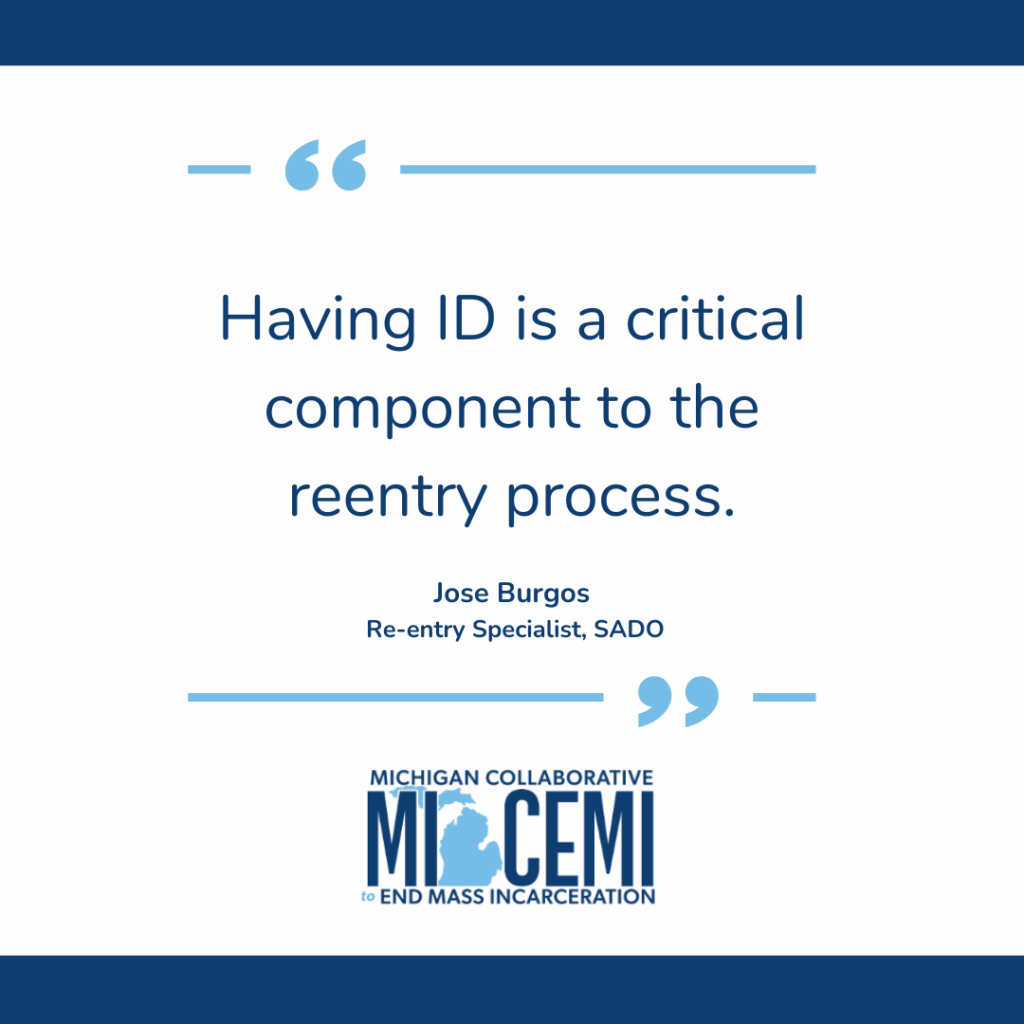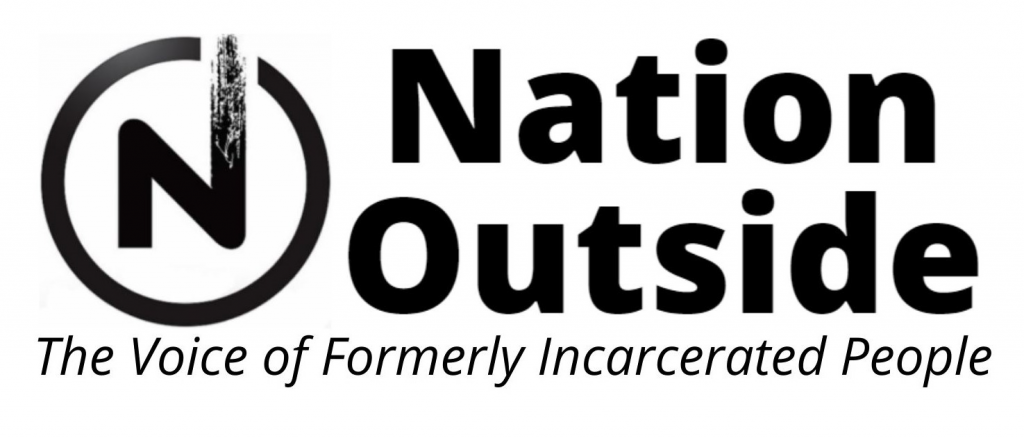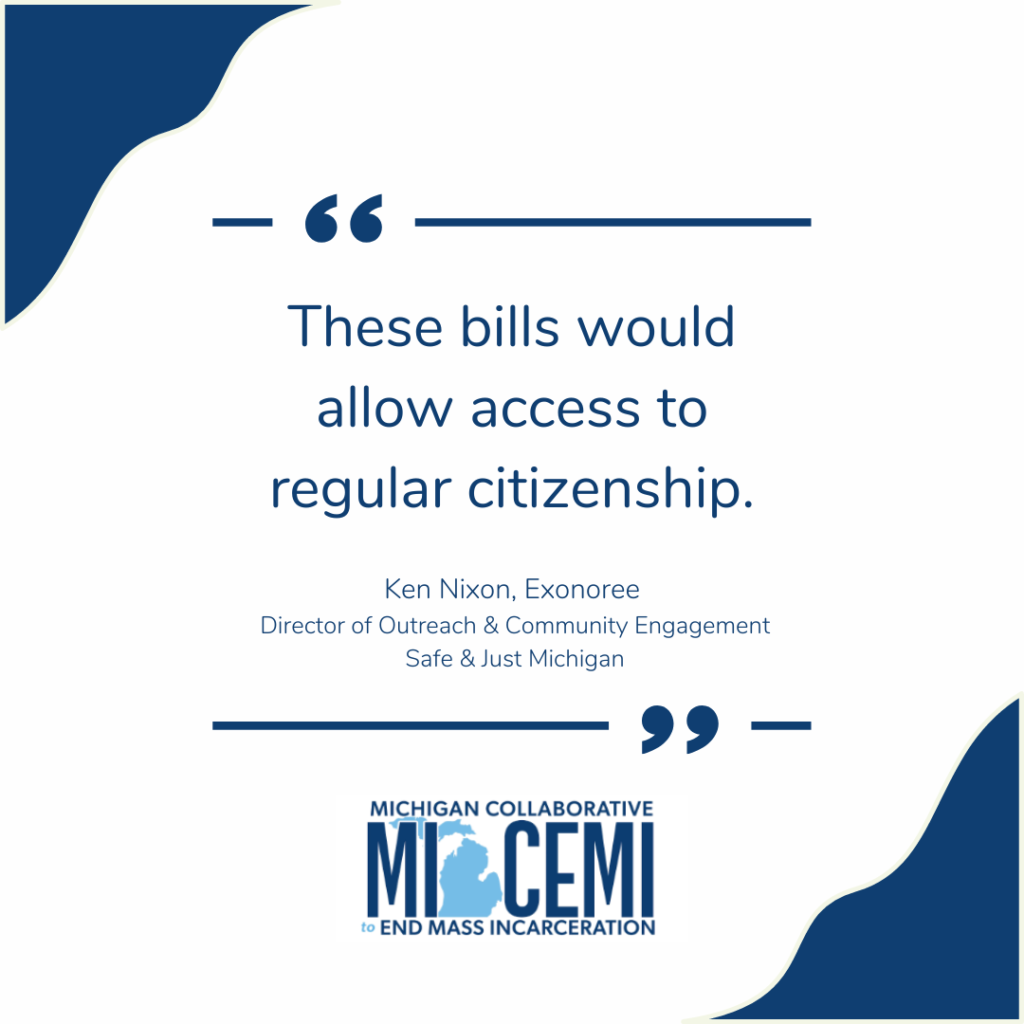Read the MI-CEMI Press Release here.
Click here for video testimony of lived experience from formerly incarcerated individuals.


“Not having access to a basic ID upon release is a major barrier. How are you supposed to rebuild your life without the necessary basics?” – Will Lewis, CEO Alumni and Detroit-based Organizer
“If we are truly embracing the idea of time served, we should support breaking barriers that may lead to recidivism. This means ensuring the marginalized have access and us working together to build equitable systems that lead to success for all.”If we are truly embracing the idea of time served, we should support breaking barriers that may lead to recidivism. This means ensuring the marginalized have access and us working together to build equitable systems that lead to success for all.” – Antoniese “Tony” Gant, Director of Policy and Programs Operations for Nation Outside

“Vital documents play an extremely important role in providing a smooth transition back into society and maintaining a sense of self-confidence. Especially for someone that is a returning citizen. Not having proper documentation creates frustrating barriers that can be discouraging to someone that is trying to be a positive and productive citizen in the community. “After months of failed calls and emails I, myself, resorted to desperate measures to obtain my birth certificate. I was almost arrested after I refused to leave the City County building without my birth certificate in hand. Knowing that I could not get a State ID or Driver’s License without it, I was out of options. I experienced this as someone who spent more than a decade and half incarcerated for a crime that I did not commit and was eventually exonerated. I could not imagine how difficult this process is for someone that is on parole, with limited resources and no help.”
-Ken Nixon, Founder, Organization of Exonerees
MI-CEMI Members Sign-On Letter
Together, we see and understand the challenges incarcerated Michiganders face when leaving prison when they are without the basic paperwork necessary to find employment, apply for public benefits, access medical care or secure housing. The issue of recidivism is inextricably linked with a formerly incarcerated person being denied access to the vital documents needed to participate in society.
MI-CEMI and its partners encourage support of Michigan House Bills — HB4191, HB4192, HB4193, HB4194 — to improve public safety and reduce numbers in prison systems.
It is time for Michigan to join 19 other states that already have laws helping returning citizens access identification by passing Michigan House Bills HB4191, HB4192, HB4193 and HB4194! Each of the bills centers around providing vital documents to help incarcerated individuals gain access to proper identification and paperwork prior to returning to our communities.
Recidivism affects the safety of our communities and the number of people incarcerated. Legislation to improve public safety while reducing funds spent on unnecessary criminal legal system costs has never been more important. We collectively support the passing of these bills to help incarcerated individuals gain access to proper identification and paperwork prior to returning to our communities.
As advocacy, direct service, business and faith-based organizations, we are committed to reducing return-to-prison rates after people have been released! Formerly incarcerated individuals deserve a chance to function and thrive in our society.
Success is impossible without the vital documents necessary to engage in our world. Passing legislation which ensures access to vital documents is a major step toward making that a reality. We applaud our elected officials for considering these practical and pragmatic changes, and urge them to support the vital document bills.
Sincerely,
- A Brighter Way
- ACLU of Michigan
- Avalon Housing
- Center for Employment Opportunities
- Center for Transformation
- Citizens for Prison Reform
- Detroit Disability Power
- Detroit Justice Center
- Disability Network
- Emergent Justice
- Friends of Returning Citizens
- Friends of Restorative Justice
- Humanity For Prisoners
- Ingham County Treasurer
- Interfaith Council for Peace and Justice
- Justice for Jon
- MI-CURE
- Michigan Citizens for Justice
- Michigan Clergy Connects
- Michigan Justice Advocacy
- Michigan Liberation
- Michigan Roundtable for Diversity & Inclusion
- Michigan Works! Association
- Nation Outside
- National Association of Social Workers – Michigan
- New ERA in Criminal Justice
- Organization of Exonerees
- Piper & Gold Public Relations
- Project Community, University of Michigan-Ann Arbor
- Restorative Justice Team – UUAA
- Right2Vote
- Rising Sun Ink
- Safe and Just Michigan
- Shakespeare in Prison / Detroit Public Theatre
- Shanle Psychological Services
- St. Vincent de Paul- St. Thomas Aquinas Parish, East Lansing
- State Appellate Defender Office
- The Michigan Daily, Michigan in Color Section
- Women’s Prison Writing Project
- Zen Buddhist Temple of Ann Arbor
- Along with 126 concerned citizens

“Vital records are a key component of the reentry process, without the proper identification those coming home from incarceration have a very difficult time accessing the necessary services they need to ensure a successful transition back into society. While progress has been made in this area the passage of this legislation would ensure that even if there was a change in administration those coming home from incarceration would be provided the proper identification which would enable them to properly join the workforce, obtain necessary services and most importantly not reoffend.”
Jose Burgos, Reentry Specialist
State Appellate Defenders Office
“Vital documents are an essential piece of American citizenship regardless of background, nationality, creed, or history and enables people to do things like vote and pay taxes. They also allow access to meaningful life amenities such as gainful employment, non-discriminatory housing, post secondary education, and quality health care. Not having vital documents creates a hinderance to even the most basic services that society offers!“
Safe & Just Michigan Team

